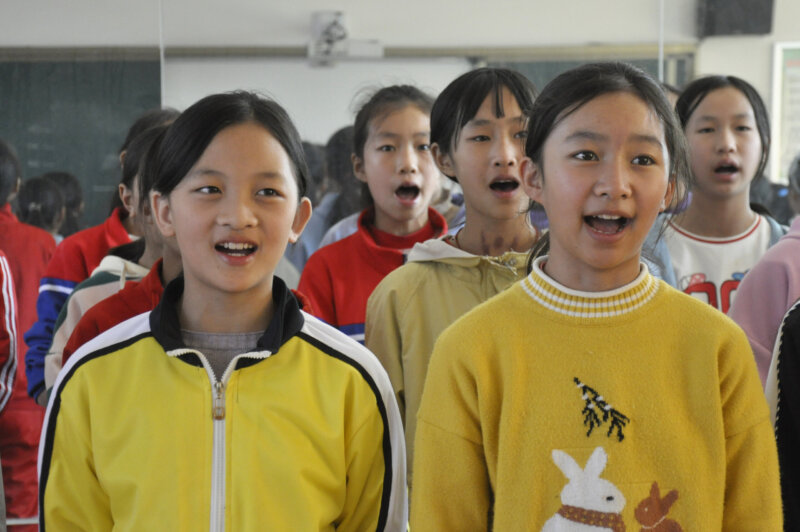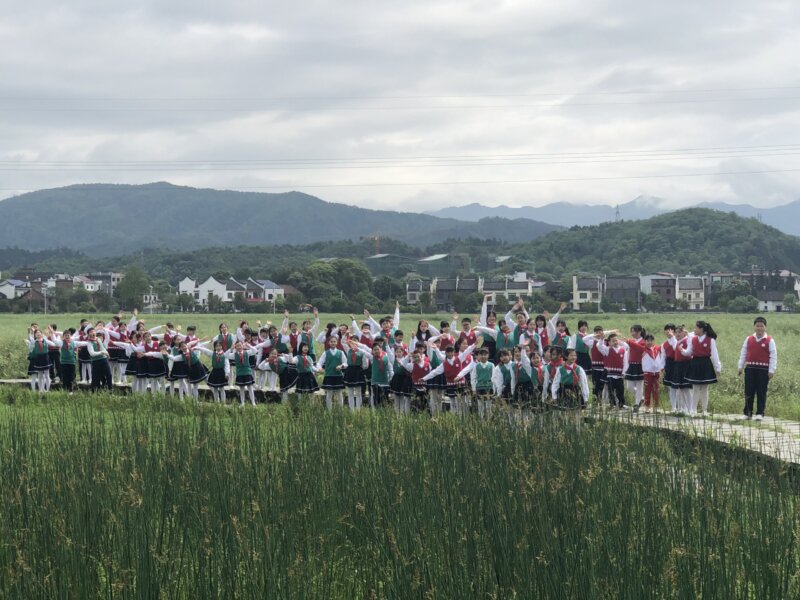In 2004, Li Kemei and her husband Tang Xiuguo (President of Sany Group) established the Deqing Education Special Fund followed by the Beijing Deqing Foundation in 2016, CAPS spoke to Li Kemei in 2021 to learn more about her story of promoting rural music education.
2004年,李克梅和丈夫唐修国(三一集团总裁)发起成立了德清教育专项基金;2016年,夫妇两人又发起成立了北京德清公益基金会。2021年6月, CAPS与李克梅女士进行了一次线上对话,希望了解她推动德清基金会做乡村音乐教育的故事。
CAPS: Can you share with us the philanthropic work of your organization?
能否与我们分享贵机构的公益事业?
Li Kemei: The Deqing Foundation focuses on rural music education. We chose a specific entry point – vocal training for children. Our goal is to enable every rural child to receive quality music education and illuminate their hearts through their voices.
李克梅:德清基金会的定位是一个小而美的基金会,我们聚焦在乡村音乐教育,选择了一个非常小的切入口——合唱,希望通过这个支点,撬动各方力量,实现“让每一个乡村孩子都能接受有质量的音乐教育”的愿景,用童声照亮童心。
Focusing on education, particularly music education, is a long-term investment that may not show immediate results. However, we believe that we are laying the groundwork for future success. As we say in Chinese, “You must prepare the soil before planting seeds.”
聚焦教育领域,尤其是音乐教育领域,意味着我们选择了一条短时间看不到明显效果的路,但是没关系,我们不着急,我们做的就是润物细无声的工作,就像土壤板结时,总要有人先做一些松土工作,苗子才能慢慢长出来。
We have been working hard over the years to create an ecosystem for rural education. Non-profit organizations focusing on rural education cannot work in silos. It’s essential to integrate our efforts with the local education ecosystem and to support local education workers, such as education foundations, education bureaus, principals, and teachers, with new ideas, mechanisms, and resources.
多年下来,我一直坚持一点,乡村的教育有它的生态,公益组织帮扶乡村教育,不能孤立地做,了解、融入到当地的教育生态很有必要,通过新的理念、机制和资源来激发当地教育工作者(教育局、教育基金会、校长和老师们)的活力非常重要。
CAPS: Is there any connection between your philanthropy and Sany Group’s corporate social responsibility (CSR) efforts?
请问您的慈善事业和三一的企业社会责任是否有关联?若有,您认为两者之间的互动关系是怎么样的?
Li Kemei: The two are closely linked. As the president of Sany Group, my husband Tang Xiuguo has a mission to fulfill the company’s social responsibilities. A major part of Sany Group’s CSR is conducted through the Sany Foundation which aims to drive innovation on important social issues. As members of the family, we have chosen to focus on music education philanthropy as our intersection point. For example, every summer, we invite at least a hundred village teachers to Changsha for intensive training. This would not be possible without the comprehensive support of Sany Group, which provides catering, accommodation and logistics.
李克梅:唐修国作为三一集团的总裁,履行社会责任也是他的使命;从个人和家族出发,我们选择了一个较小的切入口,聚焦在音乐教育公益,我们做的是小事,只能说是三一企业社会责任大版图中的一点补充。德清基金会最初起源于我和先生回馈家乡、回馈社会的想法。我们认为,一个人经营好了自己的家庭,在自己的能量半径内为家乡,为社会,为国家做些力所能及的事情是时代赋予我们的使命。从2015年基金会聚焦音乐教育公益开始,我们的能量半径逐渐越拓越宽,这离不开三一的支持。每年暑期我们都会邀请乡村师生到长沙参加集中培训,动辄几百人,没有三一集团在食住行提供支持,我们是没有底气做的。
CAPS: Are there any philanthropic projects that have inspired your work?
请问您是否能与我们分享一个您认为最为成功的公益项目?
Li Kemei: Yes, one project that I find particularly inspiring is the El Sistema project, also known as the Venezuelan National Youth Orchestra System. Venezuela was the largest oil producer and exporter in South America during the ‘50s and ’60s, but there was a significant wealth disparity in the country. Many people were unemployed, leading to social unrest and an increase in juvenile crime rates. In 1975, Dr. Jose Antonio Abreu launched the “Music Society Movement” and established the first youth orchestra in Venezuela. Two years later, this orchestra achieved impressive results in international music competitions held in the UK, which caught the attention of the Venezuelan government. In 1977, the government supported the establishment of the State Foundation for the National System of Youth and Infant Orchestras of Venezuela (FESNOJIV), hoping to influence society through music education.
李克梅:德清基金会主要聚焦在音乐教育领域,所以更多地关注这个类别的公益项目。我个人非常喜欢委内瑞拉国立青少年管弦乐团系统这个项目。委内瑞拉是南美洲最大的石油生产和出口国,但国内贫富差距巨大,特别是在上世纪五六十年代,全球石油生产过剩的背景下,大量底层人民失业,社会动荡,青少年犯罪率不断攀升。1975年,阿布莱坞博士发起“音乐社会运动”,组建委内瑞拉第一支青少年管弦乐团,2年后,这支乐团在英国阿伯丁举办的国际音乐赛事中获得好成绩,由此受到政府关注。1977年,政府支持成立委内瑞拉国立青少年管弦乐团系统基金会,希望通过音乐教育影响社会。
This project was successful for two reasons. First, the project has a well-designed structure that makes it actionable and sustainable. The project’s goal is clear, not only to cultivate musicians but also to instill a sense of responsibility, happiness, and passion for music, while becoming a contributing member of society. The project achieves this through a pyramid-shaped talent cultivation system, where children progress through choir, children’s orchestra, youth orchestra, and a professional orchestra. Group-based lectures solve the problem of insufficient teachers and help young people develop strong values. Peer teaching is also encouraged which helps improve the efficiency of rehearsals and creates a pool of future teachers.
之所以觉得这个项目成功有两个方面:一是项目本身体系设计科学,可行性强且能可持续地执行下去。首先,项目的目标非常清晰,并不是培养音乐家,而是培养有责任感、幸福感,热爱音乐,对社会有贡献的公民。围绕这个目标,项目设计了金字塔培养体系,以社区为中心集中授课,从3岁开始接受登记入团,逐步从合唱团、少儿乐团、青少年管弦乐团、专业乐团的阶梯式路径培养青少年。团队一起接受授课既能缓解教师不足的问题,也对于青少年形成正确的三观有极大帮助,同时项目还提倡“同辈教学”,高级团队学生有义务担任初级团队的指导,这样不仅有助于提高日常排练效率,让乐团氛围更加轻松友爱,同时还培养了未来的教师储备资源。
Second, this project can be replicated. The project’s management model is top-down, where foundations can establish community centers and provide funding for their basic operations. Community centers can utilize societal resources and parent groups to raise 20% of the funding needed. They can also maintain close contact with companies, families, and young people in the community. The project’s management model has significantly reduced the juvenile crime rate in the community and improved the living environment. As of 2017, more than 300 community centers have been established, providing systematic music education to 350,000 young people every year, which is 1% of Venezuela’s population. Over 40 countries and regions worldwide have drawn inspiration from this project when creating their own models.
另一个项目的成功点在于它的可复制性,它的管理模式为自上而下,通过基金会在全国各城市建立社区中心,并拨款保证社区基本运营,同时社区中心通过各自的社区资源、家长群体等接受社会捐助,自筹20%左右的经费,与社区内的公司、家庭、青少年保持密切联系,有研究表明该项目所在社区的青少年犯罪率显著降低,这也同时改善了社区生活环境。项目的管理模式决定了它可以有效地复制到委内瑞拉其他社区,截至2017年,委内瑞拉建立了超过300个社区中心,每年35万青年能接受到体系化的音乐教育,这一数字占委内瑞拉人的1/100。全球有40多个国家和地区复制了或参考了该项目,建立了各自的青少年管弦乐团系统。
CAPS: How has this project influenced your work?
这个项目对您的公益事业有什么样的启发?
Li Kemei: I think that learning from the execution and actual effect of the El Sistema project is very valuable. It has inspired me to think about how our “Happy Chorus 3+1 – the Promotion of Choral Art in Rural Middle & Primary Schools” project can benefit more rural teachers and students. A choir can also help alleviate rural children’s loneliness and boost their confidence and happiness. My country has a strong tradition of choral singing, particularly in singing patriotic songs, which provides a good foundation for the choral community.
李克梅:这个项目不管在执行还是效果上,都是很值得学习的,这不禁让我想到我们自己的“快乐合唱 3+1—乡村中小学合唱艺术推广”公益项目,如何让更多乡村师生受益,是我一直在思考的。与乐团一样,合唱团也是团体艺术,有助于缓解乡村孩子们的孤独情绪,帮助他们更自信更快乐地成长。且我国一直有红歌合唱的传统,合唱群众基础较好。

The “Happy Chorus 3+1” project may seem complicated, but it has a simple underlying logic, consisting of three modules: building a teacher training system to help deliver excellent music classes, providing a chorus performance platform to accompany children’s growth, and setting up a research and exchange platform to promote rural aesthetic education development. As of December 31, 2022, the “Happy Chorus 3+1” project has trained 8,410 music teachers, hosted 5 “Happy Chorus 3+1” public benefit concerts, and successfully conducted “Primary and Secondary School Chorus Performances” in 14,970 classes across 763 primary and secondary schools in 19 counties across three provinces, benefiting 863,577 students.
“快乐合唱3+1”这个项目看起来复杂,但其实底层逻辑很简单,分三个模块:构建教师培训体系帮助上好音乐课,提供合唱展演舞台陪伴孩子成长,搭建研究交流平台推动乡村美育发展。截至2022年12月31日,“快乐合唱3+1”项目培训了8410人次音乐教师,举办了5场“快乐合唱3+1”公益音乐会,在三省19县763所中小学14,970个班级顺利开展了“中小学合唱展演”,惠及863,577名中小学生。

We started with the project design and management model, aiming to create a stepped choral growth system and music teacher training program that is suitable for China. We also want to develop a platform that showcases the project’s achievements in multiple areas, intending to provide every rural child with quality music education.
我们从项目设计和项目管理模式着手, 希望能通过打造适合中国国情的梯级合唱团成长体系、阶梯式音乐教师培训体系和多维成果展示平台,让每一个乡村孩子都能接受有质量的音乐教育。
It is an honor to be interviewed by CAPS, and I hope that this opportunity will enable more people to see how foundations in China are promoting the popularization and development of music education through the chorus charity program.
这次非常荣幸能够接受亚洲公益事业研究中心(CAPS)的访谈,希望以此契机也能让更多人看到中国的基金会是如何通过合唱公益项目推动音乐教育普及和发展的。

